Modi tour: Seven things about Africa and India
- Published
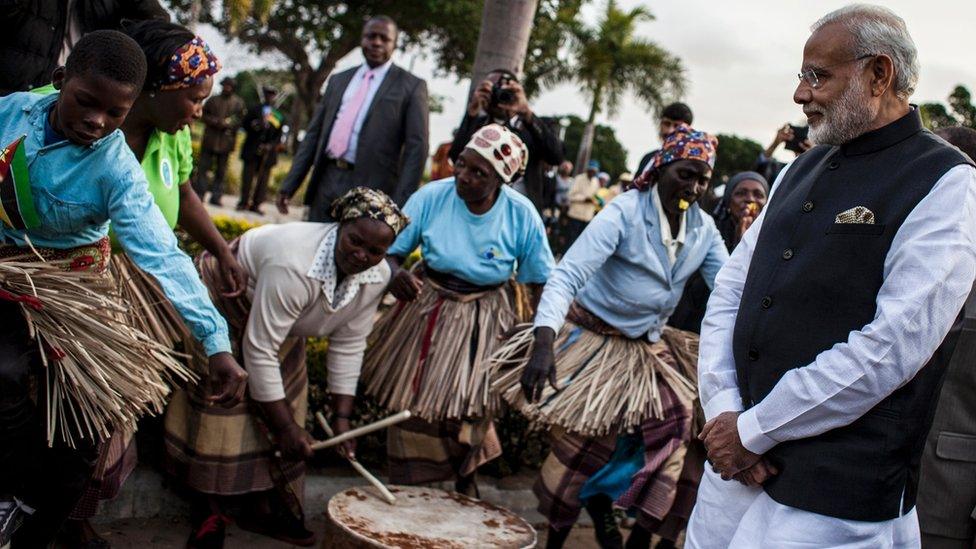
India's Prime Minister Narendra Modi is on an African charm offensive, visiting four nations where he hopes to tie up energy and trade deals and remind the continent of their cultural bond.
Historic ties stretch back to British and Portuguese colonial rule, when a large number of Indians migrated to Africa. But how do things stand now?

Africa to feed India?
Indians may have spiced up food in Africa - introducing samosas and biryani - but now it is India that is looking to the continent to keep plates full - and at an affordable price, by growing lentils.
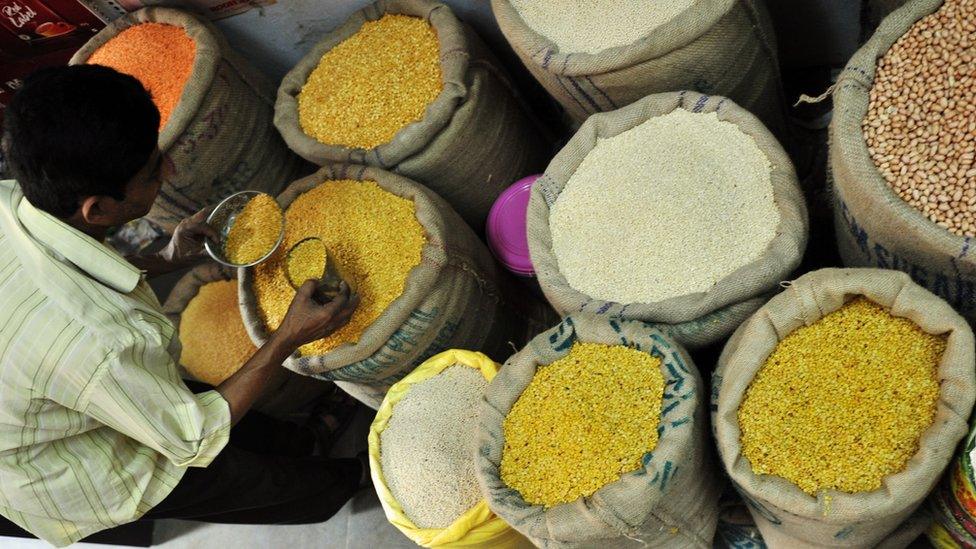
Mozambique will be offered Indian advice to sure their lentils taste like home-grown fare
Known as "daal" in India, these pulses are the staple diet for millions of Indians but prices have doubled in the past 18 months because of two successive drought years.
So Mr Modi has signed a deal with Mozambique to produce 100,000 tonnes of pulses over the next year, which it aims to double in four years at a fixed price. And to avoid any complaints from fussy eaters, India will advise on their cultivation so that the taste is correct, India's information minister has said.
Indians consume nearly 22 million tonnes of pulses annually, so this may seem like a piddling deal, however it is indicative of the opportunities the Asian country sees in Africa where large tracts of land go uncultivated. Investing in African agriculture has been top of India's agenda for several years- though land, and who farms it, is a contentious issue. It has led some Indian farmers who tried their luck in Africa to reportedly give up, external.
To this end the option of contract or co-operative farming instead of leasing land, as with the Mozambique model, is being explored.

Racism and patriotism
"For me personally, this visit is an opportunity to pay homage to two of the greatest human souls to have ever walked this Earth - Mahatma Gandhi and Nelson Mandela," Mr Modi said on his arrival in South Africa.
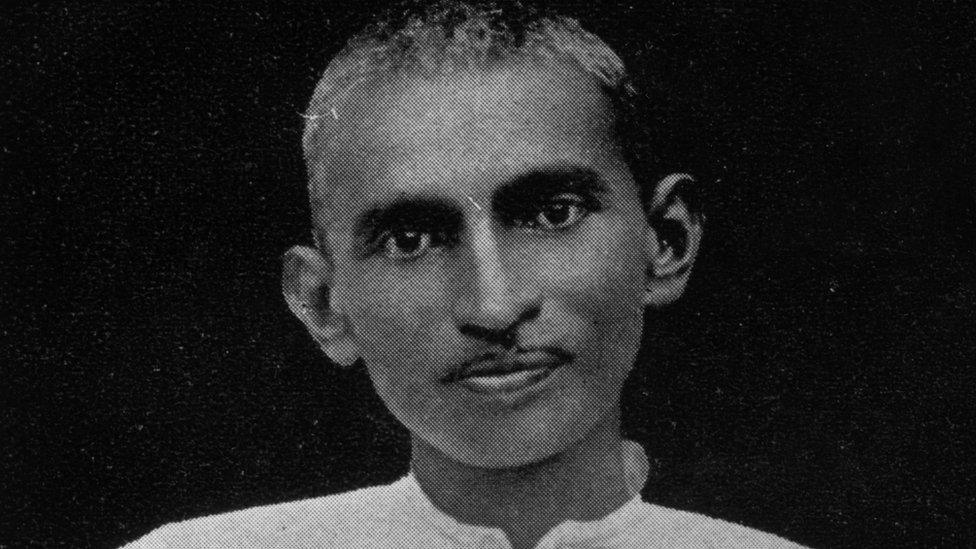
Mahatma Gandhi was working as a lawyer when he arrived in South Africa as a young man
Indeed the fight against racial discrimination is what most unifies the two nations. Over the weekend, the Indian prime minister took a train journey to Pietermaritzburg Station, where a Mahatma Gandhi was thrown off a train in 1893 because the young lawyer refused to leave his first class compartment, reserved for white passengers. This spurred him to take up his lifelong fight for equal rights that changed the history of both South Africa and India.
Xenophobia is now the demon South Africa needs to tackle - and many Indian traders, who are seen as exploitative, have faced attack there. But it is the racism in India that has been centre stage more recently - with a spate of attacks on Africans, many of whom go to study at Indian universities. As Kenya's Daily Nation newspaper put it, external, it's "time for India to explain its promise to protect Africans on its soil".
BBC Pop Up: What's it like being black in India?
Mr Modi has been pushing for diaspora Indians to register as a Non-Resident Indian (NRI) to get an Indian passport and pay tax. However, while many Indians in Africa look to their motherland for their cultural fix, most feel patriotic to the home of their birth and the feel Africa offers them greater opportunities.

Medical tourism and cheap drugs
Thousands of patients from Africa travel to India every year to seek specialised treatment. In 2015 more than 10,000 Kenyans did so, spending $98m (£76m), according to government in Kenya, which is Mr Modi's last stop.
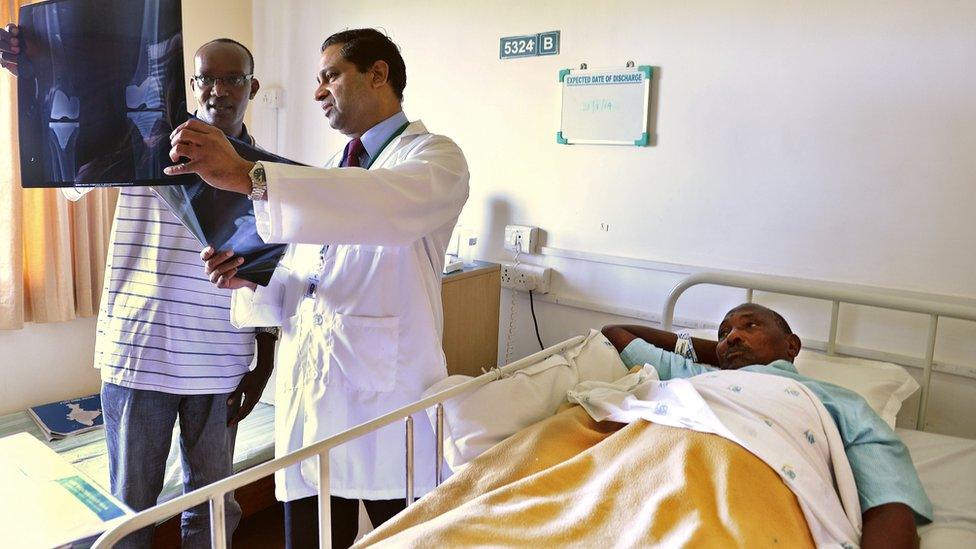
Medical treatment in India is often cheaper and better than private care on offer in Africa
Specialist treatment for diseases like cancer is becoming increasingly expensive in Kenya. Few private hospitals are equipped to provide treatment, and those that are charge high rates. Many middle class Kenyans believe it is cheaper to get an air ticket, visa, accommodation and pay for treatment in India than it is to go to a private hospital in the capital, Nairobi, for treatment.
The public hospitals are cheaper but overstretched and not adequately equipped to handle the number of cases. Cancer patients can wait as long as a year to get a cheap radiotherapy appointment at a public hospital. This is why many Kenyans end up opting to fundraise or sell property to seek a faster or cheaper cure in India.
But among a raft of African aid and investment promises India made last year, $10m was to an India-Africa Health Fund. Providing affordable drugs will be key to this initiative - many HIV patients in Africa are dependent on cheaper generic Indian ARVs. And according to Kenya's Daily Nation, a deal will be signed for India to help set up a cancer hospital in Kenya and supply it with a telecobalt machine.

India hair, cars and Bollywood
The most in-your-face example of the strong trade links between India and Africa is the hair on women's head - with upmarket hairdressers doing a roaring trade in Indian hair weaves, which makes millions for India annually.
Why South African women like Indian hair
At street level, there are Indian wheeler dealers and Tata cars, on screens there are Bollywood movies. People will flock to fill up cinemas in Tanzania - which is the third country on Mr Modi's tour - even if a film isn't dubbed or have subtitles.
China's annual trade with Africa stands at $200bn, compared to India's $72bn - but India's influence seems more visible - perhaps not surprising given the large Indian communities, especially in former British colonies, where they were brought in as indentured labour to work on sugar plantations and build railways.
And, according to the South African presidency, external, despite the dominance of China, India is South Africa's largest trade partner. It said trade in 2015 was almost $6.7bn.

The Guptas
Arguably the most controversial arrival from India to Africa in recent years is the Gupta family, who, through their investment company Oakbay investments, have interests in computers, mining, air travel, energy, technology and the media and employ about 10,000 people. Originally from India's northern state of Uttar Pradesh, they came to South Africa in 1993.
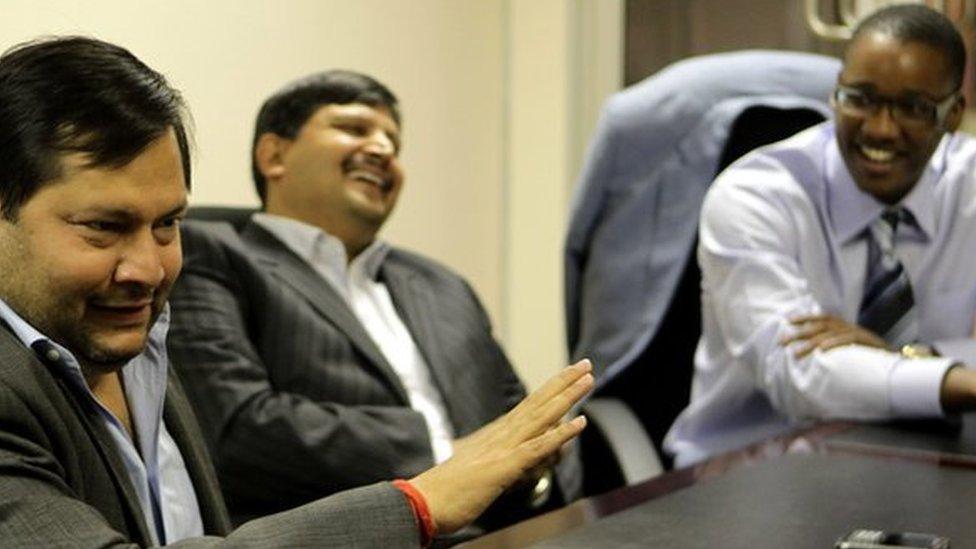
The Guptas do not have business interests in India
Their infamy lies in their close relationship to President Jacob Zuma and allegations of their influence on government - which came to a head last year over the appointment of a finance minister.
The country's corruption watchdog is now set to investigate them. Their TV channel has been the only one to give prominence to Mr Modi's state visit to South Africa. But he may be wondering why, given the pressure the family has been under in South Africa, the Guptas have chosen Dubai as a second base and not their motherland.

Fighting pirates
All four countries on Mr Modi's tour are on the Indian Ocean coast, which has been a piracy hotspot in recent years. With warships patrolling along the Somali coast, the pirates have operated further away and even staged some attacks closer to India than Somalia.
The Indian Navy has played a significant role in these patrols off the East African coast to protect trade routes. So maritime security has been touted as one of the major objectives of the Indian prime minister's trip.
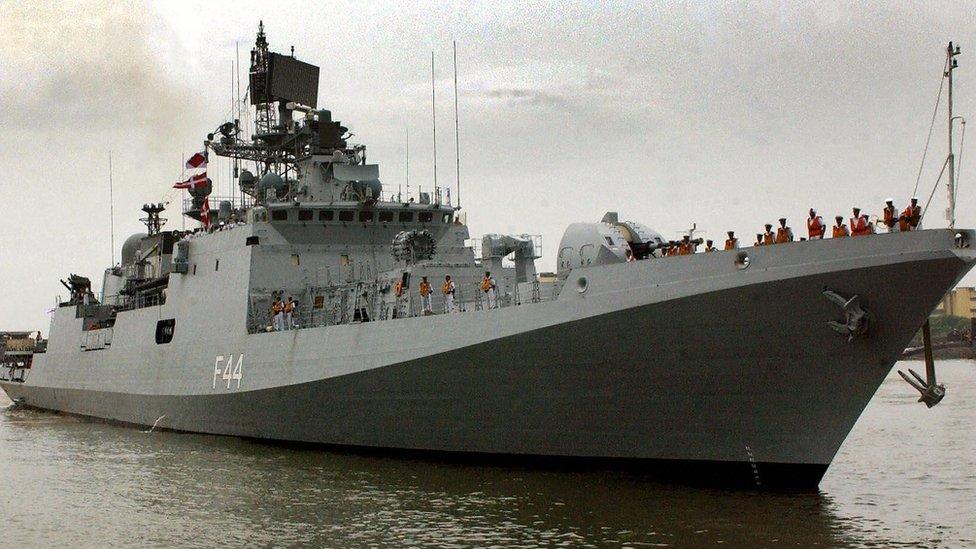
The INS Tabar sank a pirate "mother ship" in the Gulf of Aden in 2008
"It is an ocean of many economic opportunities," he is quoted as saying. Co-operation on training and the supply of equipment for securing the coastline is on the cards.
Indian soldiers are often deployed on UN peacekeeping missions in Africa, and now Mr Modi is keen to explore defence manufacturing projects in South Africa.
"Our companies can also pool their capacities to jointly develop or manufacture defence equipments and platforms. And, not just to meet our defence needs, but also to respond to regional and global demand," he said.

Buddy building
The populations of India and Africa combined account for a third of the world's population - and for years they have been lobbying for reform of the UN Security Council.
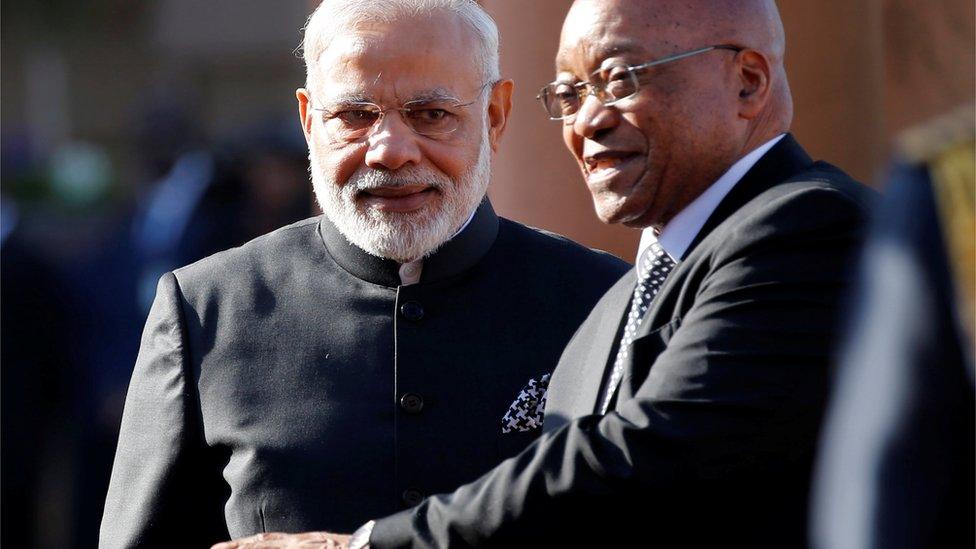
After meeting Mr Modi, President Zuma said 100 Indian firms already operated in South Africa
South Africa and India support each other's bids for a permanent seat - India backing South Africa over Nigeria - the other big powerhouse of Africa.
This is hardly surprising given that India was the first country to put the issue of apartheid on the agenda at the UN General Assembly in 1946. Plus they are both members of the Brics group of emerging economies.
While in South Africa, Mr Modi has been bolstered by assurances that the country endorsed India's bid to join the Nuclear Suppliers Group (NSG), set up to stop the proliferation of nuclear weapons by controlling access to sensitive technology. Joining the group, set up in response to India's first nuclear test in 1974, is a major foreign policy ambition - and suffered a setback recently when reportedly blocked by China.
- Published30 October 2015
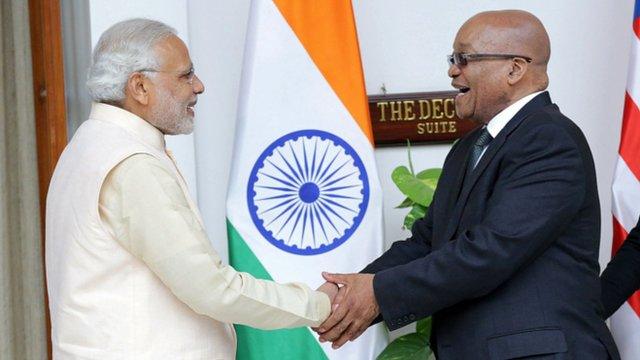
- Published19 December 2014
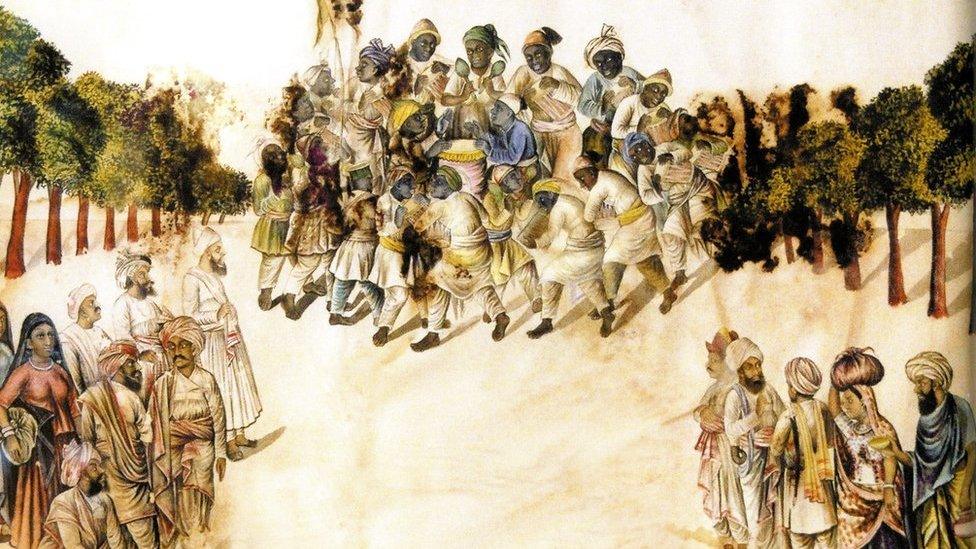
- Published29 October 2015
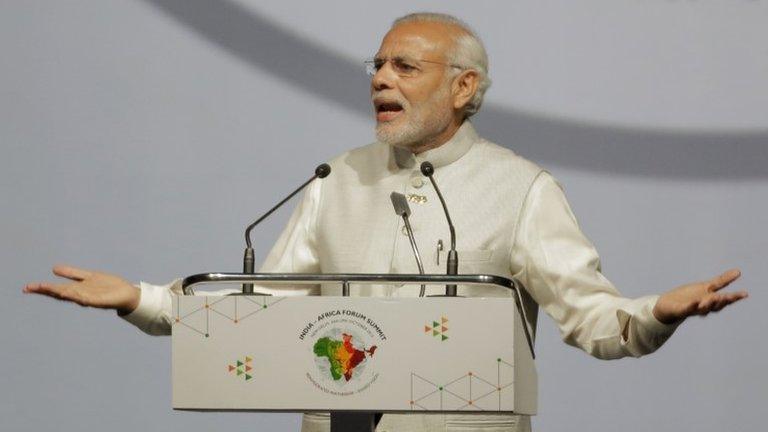
- Published14 April 2016

- Published1 May 2014
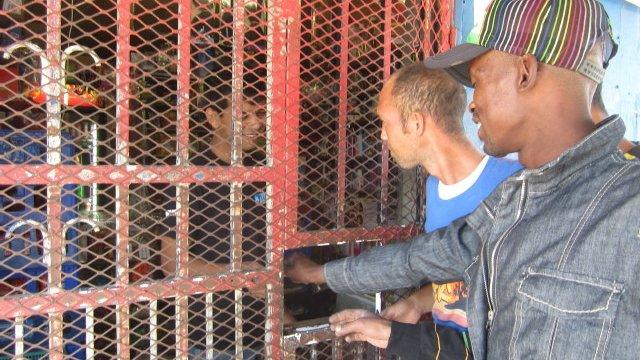
- Published17 September 2015
- Published3 June 2013